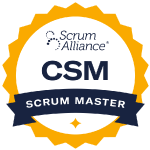Overview
Beginning with the history of agile development and moving through the disciplines promoted by Scrum, the Certified ScrumMaster® (CSM®) training course gives you a comprehensive understanding of the Scrum methodology while specifically reviewing the behaviors expected of a ScrumMaster. This two–day Certified ScrumMaster training course is suitable for those practicing or looking to practice the art of the ScrumMaster but is highly valuable for anyone involved in Scrum.
Even projects that have solid, well–defined project plans encounter some degree of change and waste. Shifting market conditions, budget cuts, staff restructuring, or any number of influences disrupt the best plan while contributing to customer dissatisfaction and staff discouragement. Moreover, projects that begin with changing or unclear requirements make it difficult to establish project expectations. Scrum is the agile development process that allows teams to deliver usable software periodically throughout the life of the project, evolving with new requirements as the project proceeds.

- Attend a face-to-face course taught by a Certified Scrum Trainer® (CST®), or receive private coaching from a Certified Agile Coach® (CAC™)
- Have 14 hours of live online or 16 hours of in-person training with your CST, or 25 hours of face-to-face interaction with your CAC™
- After successfully completing the course, you will need to accept the License Agreement to take the 50 question CSM® test that’s available in 13 languages
- To pass the test, you must score at least 74% on the 50 question exam.
GSA: $649 USD
16 PDUs
Next Upcoming Course

Train up your teams with private group training
Have a group of 5 or more students? Cprime also provides specialist private training with exclusive discounts for tailored, high-impact learning.
Certified ScrumMaster®(CSM®) Schedule
Full Course Details
Part 1: Scrum Theory
- Empiricism and the three empirical pillars
- Benefits of an Iterative and Incremental approach
- The Scrum Framework
- Scrum Values
- Scrum alignment to the Agile Manifesto
Part 2: The Scrum Team
- The responsibilities of the Scrum Team
- The responsibilities of the Product Owner, Developers, and Scrum Master
- Single Product Owners
- Product Owners own the Product Backlog
- Delivering an Increment
- Benefits of a cross-functional and self-managing Scrum Team
Part 3: Scrum Events and Activities
- Benefits of Timeboxing
- Purpose of a Sprint
- Define and perform Sprint Planning, Daily Scrum, Sprint Review, Sprint Retrospective
- Product Backlog Refinement
- Inspecting and Adapting events
- When to cancel a sprint
- Daily Scrum is not a status meeting
Part 4: Scrum Artifacts and Commitments
- Purpose of the Product Backlog, Sprint Backlog, Increment
- The commitments of Product Goals,Sprint Goals, Definition of Done
- Product Backlog emergence
- Attributes of a Product Backlog
- Sprint and Increment relationship
- Evolution of a Definition of Done
- Multiple Teams working on one Product Backlog
Part 5: Scrum Master Core Competencies
- Facilitation
- Facilitating decision making
- Teaching
- Coaching
- Mentoring
Part 6: Service to Scrum Team, Product Owner and Organization
- How does a Scrum Master serve the Scrum Team
- Explaining Technical Debt
- Understanding development practices to improve quality and reduce technical debt
- Supporting the Product Owner
- Organizational impediments that affect Scrum Teams
- Techniques for resolving impediments
- Why are there no Project managers in Scrum?
This Scrum Master (CSM®) certification program was developed for any professional who is currently involved in or will become involved in the running of Scrum projects.
Professionals who may benefit include:
Current Scrum Team Members not certified:
- Business customer, user or partner
- Product Owners
- Team Members
- Acting ScrumMasters who currently are not scrum certified
Positions within organizations that are interested in moving to Scrum:
- Project Manager
- Project lead
- Project sponsors
- IT Manager/Directors
- Business Analyst
- Developers/Programmers
Please note: This course has an Attendance and Virtual Camera Requirement
- Attendance is required throughout the duration of this course. Instructors will verify each student's attendance and participation to ensure course completion.
- Webcam usage is required by all students
- Explain and facilitate the Scrum roles: team member, Product Owner, ScrumMaster
- Use the foundational, critical concepts of Scrum
- Apply empirical thinking to your project work
- Understand your team's productivity and lead them to improve it
- Communicate the importance of organizational agreement on software readiness
- Appreciate that the ScrumMaster role can be the most satisfying as well as the most difficult job on a project
- Embrace the role of conflict resolution in Scrum
- Work on real-world Scrum projects
- Utilize the Scrum framework
- Know when software is "done" under Scrum
- Attendees must pass a 50 question assessment with a minimum of 74% upon course completion before a certification is issued.
- There will be a 60-minute time limit for the exam.
- Certifying Test is issued directly from Scrum Alliance via email and taken online.
- 1 retake is included if the student does not pass the first time. There is no cool off period so the retake can be completed immediately. If the student does not pass after the first retake there is a $25 fee for each additional retake.


This was one of the best courses I have ever taken. Kim was excellent and very engaging in a virtual environment. She kept everyone engaged and related real world examples with the material she presented.
-Darlene G., W.W. Grainger